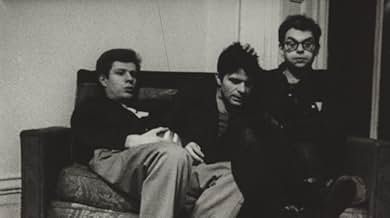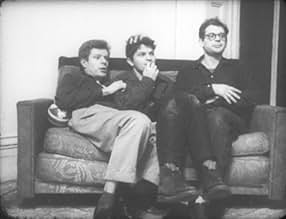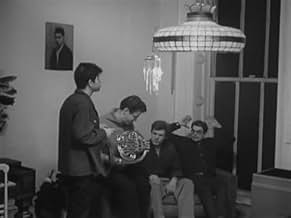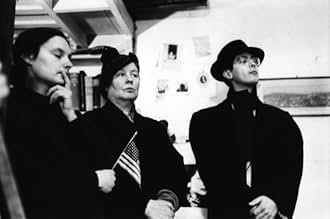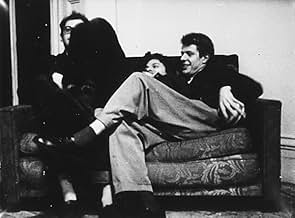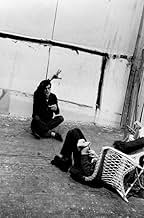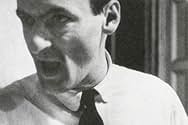A married couple vainly hopes that their irreverent beat poet friends will behave themselves when the bishop comes to visit.A married couple vainly hopes that their irreverent beat poet friends will behave themselves when the bishop comes to visit.A married couple vainly hopes that their irreverent beat poet friends will behave themselves when the bishop comes to visit.
- Awards
- 1 win total
Allen Ginsberg
- Allen
- (as Alan Ginsberg)
Delphine Seyrig
- Milo's Wife
- (as Beltiane)
Richard Bellamy
- Bishop
- (as Mooney Pebbles)
- Directors
- Writer
- All cast & crew
- Production, box office & more at IMDbPro
Featured reviews
I, too was taken in by Kerouac's writing when I was adolescent. Free sex with willing babes, philosophy, drugs, travel, adventure, freedom to the max - what could be wrong with that? Why women would be interested in his lifestyle was less apparent to me. He could obviously talk for days and nights. Which together with his ability to remember conversations word for word for a long time makes me think of someone with a light touch of autism. Also the distance to others that is apparent in his writing. In the end he came across as a troubled and melancholy soul. This film gives us a rare view of the environment he spent part of the fifties in together with his chummy beatniks, where a myth was born (and is still being fed by some). You also get his voice over which runs the length of the film and is much like his writing. Endless associations and playful word games, stream of consciousness as they call it. One of the things that now puts me off is the negative depiction of women, in this film and in beat culture overall - unless they are the kind who are easily subordinated and available. Delphine Seyrig as the mother who actually feeds her son and takes him to school is the bad guy here. As is the Bishop's mother with her unamused expression - here you have them both, the mother and the wife from a beat perspective. Seyrig later went on to direct "Scum manifesto", no doubt fed up with a--holes like these jerks who never did the dishes. The talented David Amram wrote the score and plays some horn. He has called Kerouac a genius and one of the greatest of communicators, and I wouldn't mind having spent time with Jack. But I would rather have spent that time say, with Henry Miller, who was more joy than sorrow, and a better writer. Having said his, I too can feel nostalgia when I think of the beat era. I once went to a reading by Ginsberg and Orlovsky and was moved to tears and laughter like the rest of the audience. But, if you want the real story rather than the myth, read Carolyn Casady's "Off the Road" for starters. Btw, this film can be seen at google video.
Perhaps the definitive Beat flick "Pull My Daisy" stars some of the foremost figures of the fabled Beat Generation from the literary genre's prime. Based on a play by Jack Kerouac the film is narrated by Kerouac himself as fellow Beat compadres Allen Ginsberg, Gregory Corso and Peter Orlovsky chat, horse around and try to behave in a family setting. Friendship, familial interactions, music and intellectualism ("Is Baseball holy?") constitute the gathering. While not among the best shorts as this slow going and tedious affair will appeal to die hards alone the personages involved make it priceless and essential. Historical, charmingly pretentious and fascinating this is one every film buff and lit enthusiast should view.
Various "Beat Generation" luminaries hang out in a New York apartment. I usually couldn't care less about the Beats, but this short film is fairly absorbing, thanks mostly to Jack Kerouac's vibrant narration. It makes me nostalgic for the '50s, and I wasn't even around back then.
Although this "short" is very hard to find - you are most likely going to have to hunt for a bootleg copy somewhere - it is worth the hunt for anyone who understands the historical context of the picture. It was the only film the beats ever made, and the highlights can are to be found in the narration by Jack Kerouac and the musical score (classical / be-bop / jazzy) done by David Amram. The themes are typical of the beats and of Kerouac - railroad brakemen, beer, poetry, pot.. etc, but in all seriousness this is a rare gem and gives a brief look into the consciousness of the beat poets / writers. Kerouac sounds drunk and probably is drunk, but that just adds to the aura and humor of the film.
8tmv9
One of the more quintessential displays of the era of Beat poetry and Bop music. Set in a NYC apartment, the movie is narrated by Jack Keoruac and portrays the life of an artistic 'family'. From painter, poet, and musician, the movie moves quickly without any particular place to go. It strikes at the heart of the movement and should be avoided by anybody who cannot stand the sometimes 'zoned' out babble of this generation. Enjoyable and short, the film fits a small genre of the American experience.
Did you know
- TriviaDebut of actress Delphine Seyrig.
- ConnectionsFeatured in The Fifties (1997)
Details
- Release date
- Country of origin
- Language
- Also known as
- Погадай на ромашке
- Filming locations
- Production company
- See more company credits at IMDbPro
- Runtime
- 30m
- Color
- Sound mix
Contribute to this page
Suggest an edit or add missing content

